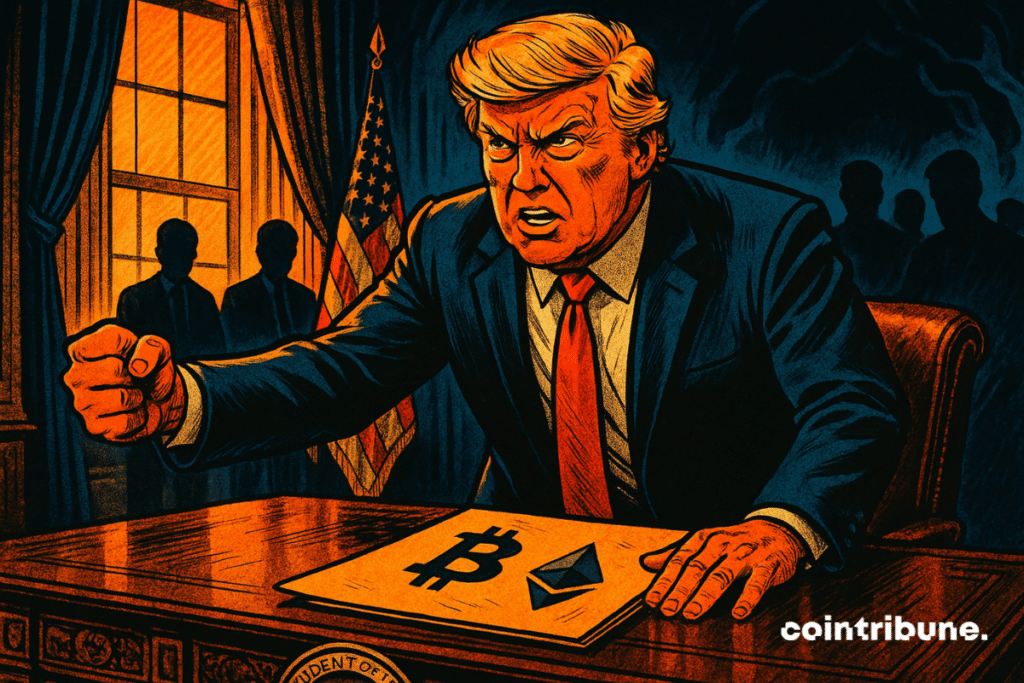Trump Calms Republican Revolt Over Crypto Bills
Donald Trump has just avoided a major political setback by rallying dissenters from his own camp. Thanks to a direct intervention in the Oval Office, he has put back on track the adoption of the flagship laws of Crypto Week. But internal tensions over central bank digital currencies (CBDCs) hint at a battle far from over.

In brief
- Trump met with 11 of the 12 Republican representatives opposed to the crypto bills and convinced them to vote in favor.
- The Republican rebellion centered on the absence of an explicit ban on central bank digital currencies (CBDCs) in the GENIUS Act.
- Thirteen Republican legislators had withdrawn their support on Tuesday, causing the votes to be canceled.
The presidential intervention in the face of an unprecedented rebellion
Donald Trump had to play the fireman on duty Wednesday night to put out a fire within his own ranks.
The American president received in the Oval Office 11 of the 12 Republican representatives who had defected on Tuesday, paralyzing the adoption of three crucial bills awaited for months by the crypto ecosystem.
“I am in the Oval Office with 11 of the 12 Congressmen/women necessary to pass the GENIUS Act and, after a short discussion, they have all agreed to vote tomorrow morning in favor of the Rule“, Trump declared on his Truth Social platform.
This direct intervention reveals the magnitude of the crisis: rarely do Republican elected officials dare to openly defy their president.
The uprising was led by emblematic figures of the party. Steve Scalise, House Majority Leader, Marjorie Taylor Greene, Andy Biggs, and Tim Burchett had all joined this rebellion.
In total, 13 Republican legislators had voted against the examination of the bills, creating a major internal crisis.
This defection caused the immediate cancellation of all votes scheduled for Tuesday, suspending the “Crypto Week” orchestrated by the Republicans.
The goal was clear: to pass ambitious crypto legislation before the Congress summer recess. The market was immediately shaken, and the most exposed assets were hit: Circle fell 7%, Coinbase 4%.
Central bank digital currencies, the red line for conservatives
The main bone of contention concerns central bank digital currencies (CBDCs). The dissenting representatives demanded that the GENIUS Act, which regulates stablecoins, include an explicit ban on CBDCs.
Their fear? The establishment of a total state surveillance system over the transactions of American citizens.
Andy Biggs was particularly vocal:
The Senate’s GENIUS Act creates a framework for a layered Central Bank Digital Currency (CBDC) and does not guarantee self-custody (the freedom to control your own money).
Marjorie Taylor Greene criticized the absence of possible amendments:
I just voted NO on the Rule for the GENIUS Act because it does not include a ban on Central Bank Digital Currency and because Speaker Johnson did not allow us to submit amendments to the GENIUS Act.
However, the texts concerned are structural for the future of the American crypto industry.
- The GENIUS Act imposes a strict framework on stablecoins: 100% dollar collateral, annual audits, oversight of foreign issuers.
- The CLARITY Act aims to allocate roles between the SEC and the CFTC, providing the long-awaited legal certainty.
- A third bill, supported by Tom Emmer, intends to ban any CBDC issued directly to the public by the Fed.
Some Republicans demanded that these three projects be merged into a single legislative package. Others criticized the adoption as being too rushed overall.
A decisive week for the future of American crypto
Trump’s intervention could well unstick a situation that was dangerously bogged down. The Speaker of the House, Mike Johnson, expressed his gratitude:
I thank President Trump for his commitment tonight so that we can pass the GENIUS Act tomorrow, and for his renewed commitment to help us advance cryptocurrency legislation in the coming days.
The House is indeed meeting on Wednesday to debate these crucial bills.This “Crypto Week” holds major strategic importance for the United States. While Europe advances on the regulation of digital assets with MiCA and China develops its own digital currency, America cannot afford to fall behind. The adoption of these laws would place the United States in the position of global leader in crypto regulation.The GENIUS Act, already passed by the Senate in June, could reach Trump’s desk before the end of the week. This bill requires dollar guarantees and annual audits for stablecoin issuers.CLARITY promises to clarify the respective roles of the SEC and the CFTC, finally providing the legal certainty long awaited by the industry.The outcome of this legislative battle will determine if Trump’s America will seize the historic opportunity to become the global capital of crypto.
Maximize your Cointribune experience with our "Read to Earn" program! For every article you read, earn points and access exclusive rewards. Sign up now and start earning benefits.
Passionné par le Bitcoin, j'aime explorer les méandres de la blockchain et des cryptos et je partage mes découvertes avec la communauté. Mon rêve est de vivre dans un monde où la vie privée et la liberté financière sont garanties pour tous, et je crois fermement que Bitcoin est l'outil qui peut rendre cela possible.
The views, thoughts, and opinions expressed in this article belong solely to the author, and should not be taken as investment advice. Do your own research before taking any investment decisions.